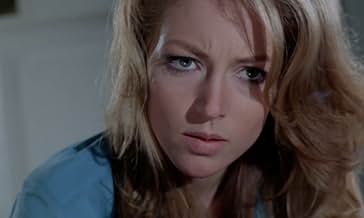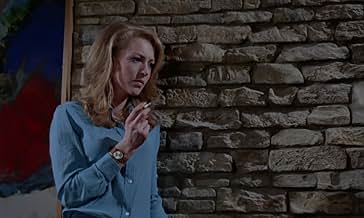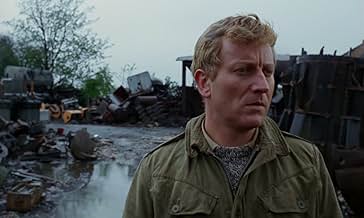AVALIAÇÃO DA IMDb
6,9/10
2,3 mil
SUA AVALIAÇÃO
Adicionar um enredo no seu idiomaA group of British criminals plan the robbery of the Royal Mail train on the Glasgow-London route.A group of British criminals plan the robbery of the Royal Mail train on the Glasgow-London route.A group of British criminals plan the robbery of the Royal Mail train on the Glasgow-London route.
- Direção
- Roteiristas
- Artistas
- Prêmios
- 1 vitória no total
Patrick Jordan
- Freddy
- (as Patrick Jordon)
Kenneth Farrington
- Seventh Robber
- (as Ken Farrington)
Roger Booth
- Detective
- (não creditado)
Ron Charles
- Seaman
- (não creditado)
Avaliações em destaque
British Peter Yates drove race cars before becoming a director and turning out some pedestrian work and a couple of respectable films, including this one and "Bullitt." Steve McQueen, another racing aficionado, having seen the spectacular car chase through the streets of London in this film, invited Yates to direct him in "Bullitt" the following year, and there is a certain concordance between the two. "Bullitt" (1968) is superior. The interrelationships are more subtle, the musical score more apt. The score in "Robbery" shrieks "generic thriller" and lacks anything like the sophistication of the flute trio in San Francisco's chic Coffee Cantata. And if the car chase in "Robbery" is thrilling -- and it is -- the high speed pursuit in "Bullitt" provides a touchstone for all the car chases that followed, from "The Seven Ups" to "The French Connection." There was never anything like it before.
Basically, "Robbery" has Stanley Baker in charge of one of those gangs consisting of specialists, one expert in electronics, another in laundering, another who knows how to be a locomotive engineer, and so forth. The heist of more than three million pounds from the Royal Mail train is tense, engaging, and a little confusing. The confusion is compensated for by the many times we see references to "Royal Mail," which sounds infinitely better than "U. S. Postal Service." "Royal Mail." It doth roll trippingly from the tongue.
No guns are displayed or used, in contrast to "Bullitt", and even in the later film there are only two brief scenes involving gunplay. The fact is that guns aren't always necessary in robberies like the one described here. Imagine, two freaky looking dudes wearing black ski masks and threatening you with crowbars tell you to drive a locomotive at 20 miles per hour, and you're a balding, near-sighted, middle-aged man. Are you going to drive that locomotive at the speed requested? You bet you are. "No guns," orders Stanley Baker. "They don't use them so we won't either." On the other hand, "Bullitt" was made in America for an American audience and the final shot is of a .38 caliber police revolver in its holster, wrapped in its shoulder harness, lying on the bathroom sink, all coiled up like a rattlesnake.
"Robbery" is a caper movie. The police are always just one step behind the gang. The gang's hideout is at a now deserted and dilapidated base called RAF Gravesley, a bomber base that once accommodated Halifaxes and Mosquitoes. It's an eerie feeling to be in a once-populated and now empty community.
I had that experience at Fort Hancock, established during the Revolutionary War to guard New York harbor from the British. It was closed during the Cold War and all its personnel departed except for a handful of Coast Guardsmen, with whom I stayed for a summer. All the empty buildings were unlocked. The hospital staff had left its microscope slides carefully packed in drawers. There was the occasional pile of 20 mm. rounds, still intact. I had a similar feeling watching the scenes shot at RAF Gravesley. It was like being in an episode of The Twilight Zone.
Overall, nice job, and an entry for Peter Yates into the Big Money of Hollywood.
Basically, "Robbery" has Stanley Baker in charge of one of those gangs consisting of specialists, one expert in electronics, another in laundering, another who knows how to be a locomotive engineer, and so forth. The heist of more than three million pounds from the Royal Mail train is tense, engaging, and a little confusing. The confusion is compensated for by the many times we see references to "Royal Mail," which sounds infinitely better than "U. S. Postal Service." "Royal Mail." It doth roll trippingly from the tongue.
No guns are displayed or used, in contrast to "Bullitt", and even in the later film there are only two brief scenes involving gunplay. The fact is that guns aren't always necessary in robberies like the one described here. Imagine, two freaky looking dudes wearing black ski masks and threatening you with crowbars tell you to drive a locomotive at 20 miles per hour, and you're a balding, near-sighted, middle-aged man. Are you going to drive that locomotive at the speed requested? You bet you are. "No guns," orders Stanley Baker. "They don't use them so we won't either." On the other hand, "Bullitt" was made in America for an American audience and the final shot is of a .38 caliber police revolver in its holster, wrapped in its shoulder harness, lying on the bathroom sink, all coiled up like a rattlesnake.
"Robbery" is a caper movie. The police are always just one step behind the gang. The gang's hideout is at a now deserted and dilapidated base called RAF Gravesley, a bomber base that once accommodated Halifaxes and Mosquitoes. It's an eerie feeling to be in a once-populated and now empty community.
I had that experience at Fort Hancock, established during the Revolutionary War to guard New York harbor from the British. It was closed during the Cold War and all its personnel departed except for a handful of Coast Guardsmen, with whom I stayed for a summer. All the empty buildings were unlocked. The hospital staff had left its microscope slides carefully packed in drawers. There was the occasional pile of 20 mm. rounds, still intact. I had a similar feeling watching the scenes shot at RAF Gravesley. It was like being in an episode of The Twilight Zone.
Overall, nice job, and an entry for Peter Yates into the Big Money of Hollywood.
This is true British gangster filming at its best.
The opening robbery and car chase, from Hatton Garden around central London and out to Maida Vale, is utterly brilliant and that's years before the French Connection or anything like that. Peter Yates was brilliant. In fact, if they re-make any British gangster film these days it should be Robbery, not Get Carter or anything like that.
The music is utterly brilliant, too. Johny Keating should be up there with the likes of John Barry, John Williams, etc. He seems to have done virtually nothing after this film.
Even the faked scenes of the train robbery itself are great despite the London-Glasgow express train really being another train on a branch line travelling at about 30 mph.
They could've made a sequeal to this, too, with the legendary and fantastic Stanley Baker shown in the New World. Same goes for the late Barry Foster.
The opening robbery and car chase, from Hatton Garden around central London and out to Maida Vale, is utterly brilliant and that's years before the French Connection or anything like that. Peter Yates was brilliant. In fact, if they re-make any British gangster film these days it should be Robbery, not Get Carter or anything like that.
The music is utterly brilliant, too. Johny Keating should be up there with the likes of John Barry, John Williams, etc. He seems to have done virtually nothing after this film.
Even the faked scenes of the train robbery itself are great despite the London-Glasgow express train really being another train on a branch line travelling at about 30 mph.
They could've made a sequeal to this, too, with the legendary and fantastic Stanley Baker shown in the New World. Same goes for the late Barry Foster.
A gang of crooks plan a big score and use other smaller robberies as a means of financing it. Clearly inspired by the Great Train Robbery of the 1960's, although the facts are shifted - maybe made for legal reasons?
This is the kind of film that I loved as child. And still do. Live-for-today criminals that stop at nothing to get their hands on the loot and heaven help anybody that gets in the way. While having the plus of the robbery and the usual gang of rent a villains it does minor variations on the expected while not leaving the well trodden track.
The car chase through central London is one of the best things here and inspired many impersonations. Indeed it is probably the first homicidal chase through a big city seen on screen.
(The chase in Bullet is a complete rip-off - although Peter Yates directed this as well!)
As another viewer noticed the dialogue is dated (no swearing!) and the thing lacks a clear hero and villain. All-in-all like watching one of the better episodes of The Sweeney (a UK TV series) and a good guide to London -- as it was back in the Swinging Sixties.
This is the kind of film that I loved as child. And still do. Live-for-today criminals that stop at nothing to get their hands on the loot and heaven help anybody that gets in the way. While having the plus of the robbery and the usual gang of rent a villains it does minor variations on the expected while not leaving the well trodden track.
The car chase through central London is one of the best things here and inspired many impersonations. Indeed it is probably the first homicidal chase through a big city seen on screen.
(The chase in Bullet is a complete rip-off - although Peter Yates directed this as well!)
As another viewer noticed the dialogue is dated (no swearing!) and the thing lacks a clear hero and villain. All-in-all like watching one of the better episodes of The Sweeney (a UK TV series) and a good guide to London -- as it was back in the Swinging Sixties.
Robbery is for me a semi-documentary / thriller based on the Great Train Robbery of 1963. The location of the actual heist, on a bridge crossing a country lane bears similarity to the real robbery. The film moves around much of 60s London in the first part, during which time the gang are robbing to gain funds, plus planning the main robbery.
The gangs' meeting on the terraces during a Leyton Orient match is well screened; Stanley Baker becomes so heated during their discussion he misses a great run and shot against the crossbar shown from the pitch!
As for the central characters, Stanley Baker superbly plays "Mr Big" Paul Clifton, who is a character that the viewer never quite gets to know the limits. For example he tells the gang "we don't need guns, the police don't carry them"; later his wife finds his revolver at home, when quizzed he says "the gun is because I not going back inside (prison)".
William Marlowe cleverly plays Clifton's "number 2" Dave Aitken, who is clearly "nice cop" versus Clifton's "bad cop" in terms of running the gang.
As with the real train robbery, the gang make a successful robbery; however mistakes made during hideway contribute to their eventual capture. Not least when their contact who "cleans up" the getaway vehicles is apprehended at an airport leaving the UK with about £50K stuffed up his coat - his capture enables the police to set up a successful trap for the rest of the gang.
The ending of the film is probably a slight movement forward from many 1950s movies where the gang are all caught - the ending to Robbery slightly leaves the viewer guessing. This is a film for enthusiasts of films of past years, who may like to spot London landmarks.
The gangs' meeting on the terraces during a Leyton Orient match is well screened; Stanley Baker becomes so heated during their discussion he misses a great run and shot against the crossbar shown from the pitch!
As for the central characters, Stanley Baker superbly plays "Mr Big" Paul Clifton, who is a character that the viewer never quite gets to know the limits. For example he tells the gang "we don't need guns, the police don't carry them"; later his wife finds his revolver at home, when quizzed he says "the gun is because I not going back inside (prison)".
William Marlowe cleverly plays Clifton's "number 2" Dave Aitken, who is clearly "nice cop" versus Clifton's "bad cop" in terms of running the gang.
As with the real train robbery, the gang make a successful robbery; however mistakes made during hideway contribute to their eventual capture. Not least when their contact who "cleans up" the getaway vehicles is apprehended at an airport leaving the UK with about £50K stuffed up his coat - his capture enables the police to set up a successful trap for the rest of the gang.
The ending of the film is probably a slight movement forward from many 1950s movies where the gang are all caught - the ending to Robbery slightly leaves the viewer guessing. This is a film for enthusiasts of films of past years, who may like to spot London landmarks.
An extended near-wordless sequence, punctuated by Johnny Keating's tension-building staccato music, follows a cleverly planned diamond heist. Followed by an exciting high-speed car chase through the streets of London, the opening scenes of Peter Yates "Robbery" illustrate cinematic story-telling at its best. Although following the diamond job, the film slows to a more sedate pace, nevertheless, director Yates keeps the focus on plot and detail with a minimum of filler. After the diamond robbery, Stanley Baker as Paul Clifton re-groups his men, and, with added members, they buy into another robbery, which he promises will be the big one and net three or four million pounds. The target is the Royal Mail Train on the eve of a three-day bank holiday. Clifton's planning is meticulous and includes springing Robinson, played by Frank Finlay, from prison with an all too easy diversion ploy. While Baker and his boys proceed, police inspector Langdon, played by James Booth, heads an investigation into the diamond heist, which hones in on Clifton and other members of Baker's group.
Cutting between the robbery plans, the inspector's work, and a brief peek at Clifton's domestic life, the film is an excellent thinly-veiled dramatization of the famous British great train robbery, which took place in 1963, four years before the film was made. The scenes of domestic crisis between Baker and Joanna Pettet as his wife are probably the film's weakest; Pettet has little to do, and her presence seems little more than a gratuitous female token. However, the screenplay by Edward Boyd, Peter Yates, and George Markstein is tight otherwise, and the shift between the plotters and the police adds suspense, although viewers may identify with the unarmed robbers and cheer them on. Peter Yates's direction is top notch, although he subsequently topped the opening car chase with a more famous one in "Bullit." Featuring good performances throughout from Baker, Booth, Finlay, and Barry Foster, "Robbery" is well directed, well shot by cinematographer Douglas Slocombe, and provides excellent entertainment.
Cutting between the robbery plans, the inspector's work, and a brief peek at Clifton's domestic life, the film is an excellent thinly-veiled dramatization of the famous British great train robbery, which took place in 1963, four years before the film was made. The scenes of domestic crisis between Baker and Joanna Pettet as his wife are probably the film's weakest; Pettet has little to do, and her presence seems little more than a gratuitous female token. However, the screenplay by Edward Boyd, Peter Yates, and George Markstein is tight otherwise, and the shift between the plotters and the police adds suspense, although viewers may identify with the unarmed robbers and cheer them on. Peter Yates's direction is top notch, although he subsequently topped the opening car chase with a more famous one in "Bullit." Featuring good performances throughout from Baker, Booth, Finlay, and Barry Foster, "Robbery" is well directed, well shot by cinematographer Douglas Slocombe, and provides excellent entertainment.
Você sabia?
- CuriosidadesIt was the realistic car chase through the streets of London in this picture, that led to director Peter Yates doing another car chase in San Francisco a year later. Steve McQueen personally wanted Yates for what turned out to be his highest grossing film Bullitt (1968).
- Erros de gravaçãoWhen the traffic warden puts the gas canister in the car, a white cable can be seen draping from the inside of the door and this is seen to be connected to the device as he removes it from his bag. There is no sign of the cable in the following close-up shot from his point of view.
- Citações
Paul Clifton: We're talking about millions of pounds now. We're talking about road blocks, car searches, house raids, shakedowns. They'll know who pulled the job. Without the money, they can't prove anything.
- ConexõesFeatured in Film Review: Film Review (1967)
Principais escolhas
Faça login para avaliar e ver a lista de recomendações personalizadas
Detalhes
- Data de lançamento
- País de origem
- Idioma
- Também conhecido como
- Robbery
- Locações de filme
- Leyton Stadium, Brisbane Road, Leyton, Londres, Inglaterra, Reino Unido(Paul Clifton plans the train robbery with Frank, Dave, Ben and Don during a football match)
- Empresas de produção
- Consulte mais créditos da empresa na IMDbPro
Contribua para esta página
Sugerir uma alteração ou adicionar conteúdo ausente




























